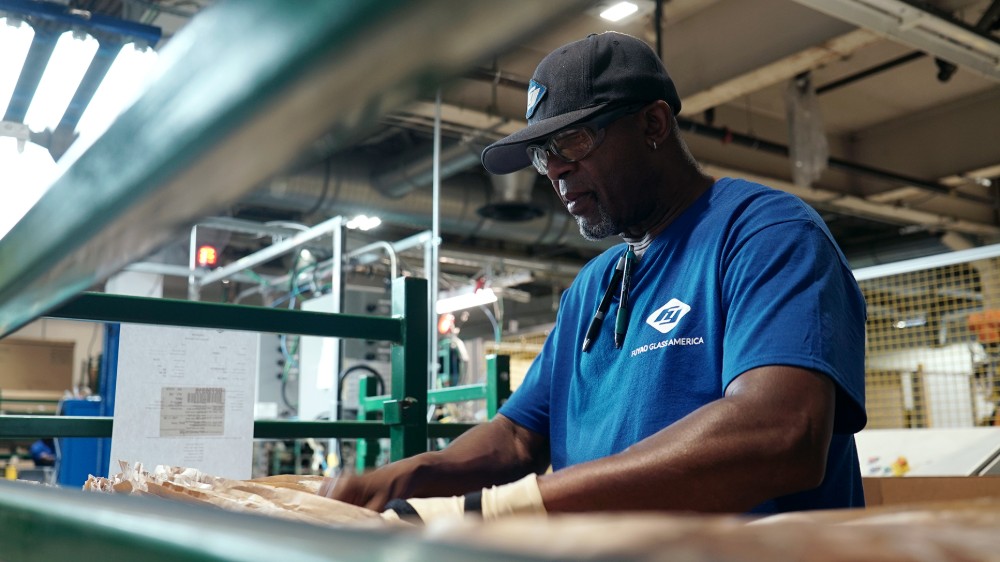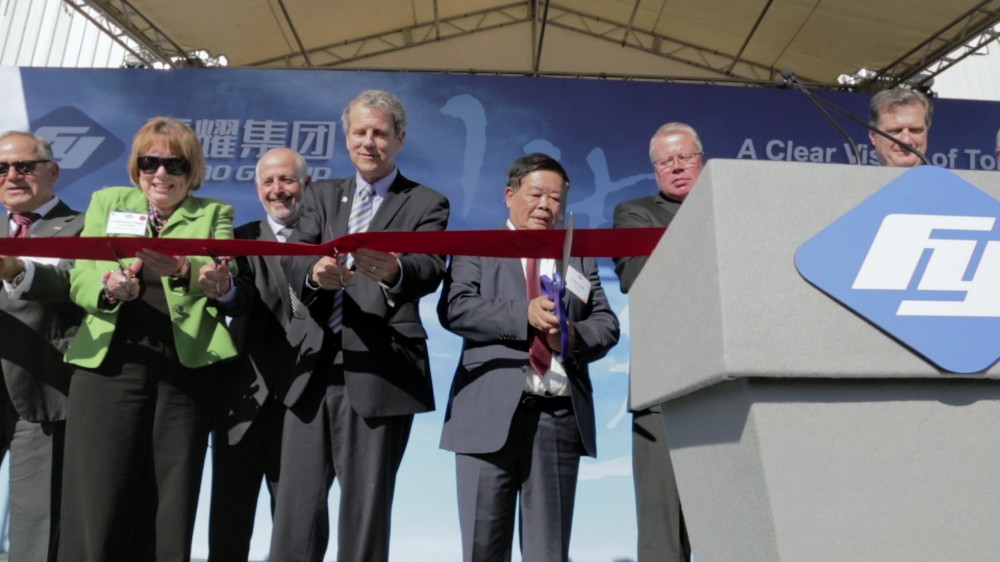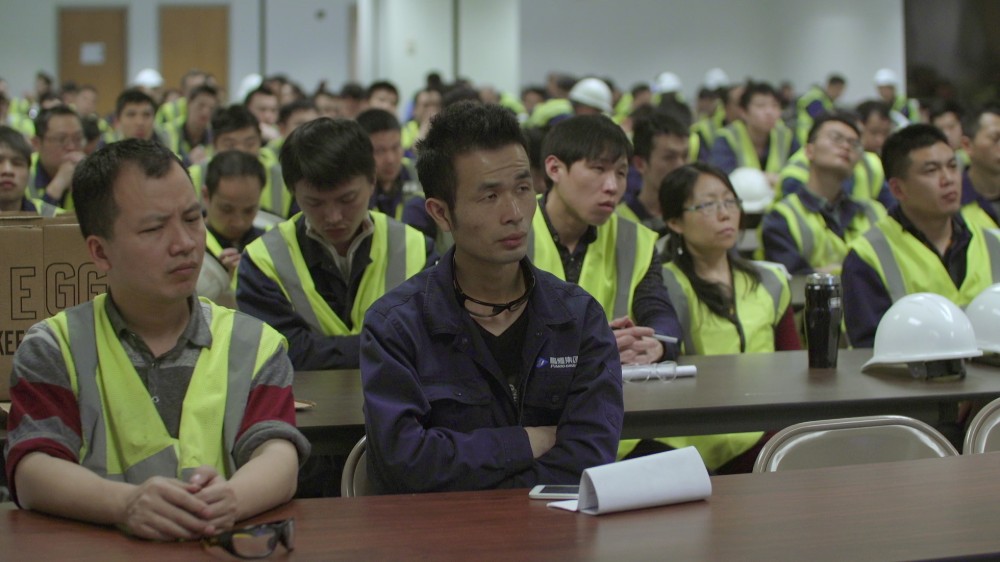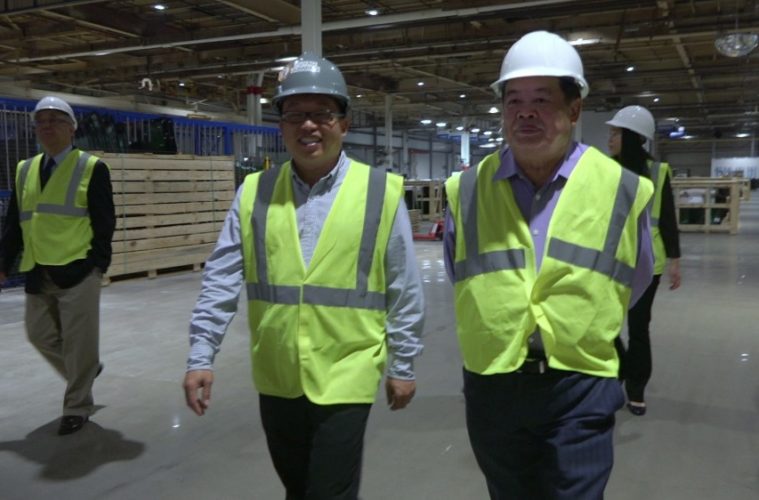In a letter to the editor of The Atlantic, Penelope Gristelfink wrote: “China is the new America. America is the new Soviet Union, and the walls are closing in.” Julia Reichert and Steven Bognar’s new documentary American Factory, through no intent of their own, makes a strong case for the former.
American Factory picks up seven years after their Oscar-nominated short film The Last Truck, which documents the closure of GM’s plant in Moraine, Ohio in 2008 and the social, economic and spiritual decimation left in its wake. Flash forward to 2015, and Chinese glass company Fuyao owned by Chairman Cao Dewang redeveloped the property to open Fuyao Glass America. Factory follows what was supposed to be a harmonious merging of cultures but resulted in an ongoing culture clash of the Chinese work ethic and labor expectations of the average American worker.
We spoke with Reichert and Bognar the weekend after the deadly mass shooting in Dayton, Ohio. Moraine, Ohio, where the factory is located, is just outside Dayton and we discussed the killing’s impact on the wider community. We also discuss the irony of Chinese communist success at global capitalism and how the filmmakers learned to depict management and employees fairly by not picking sides.
The Film Stage: How did you find out about the plant’s redevelopment? How did you get such intimate access?
Steven Bognar: Well, it was big news. We live in Dayton, Ohio. We are very proud to be from this little town. It’s a scrappy, little, industrial town. Everyone in Dayton knew someone who worked at the old General Motors factory. For generations people worked at that plant. 6,000 people worked there. It was a good job, it built a middle class in that whole region. Just as Youngstown and Pittsburgh and all these other towns had blue-collar, working-class communities. Multi-racial too, not just the white folks in the suburbs. These were folks who didn’t go to college but who sent their kids to college, who could afford a home. The GM plant in our town closed in 2008 and it was devastating. That plant sat empty, rusting for six or seven years. Then a Chinese billionaire entrepreneur bought it and it was huge news. It was like, “Okay, what?” The word went out that manufacturing jobs were coming back to Dayton, Ohio, and it was very exciting. Pretty soon, someone started saying this should be documented and our names came up because we had done an earlier film there. We had done a film about the closing of the GM plant. It’s on HBO. It’s called The Last Truck.
Julia Reichert: It’s a short. It’s actually like a prequel to this film. This film actually has some of the footage comes it. It’s only a 40-minute short. It was an Oscar nominee and it was a good film. It’s sad. It’ll make you cry.
Bognar: As an aside, it’s weird being in New York these days given the mass shooting that just happened. We’ve been talking to our friends and family back home and keep our pulse on how people are doing.

Do you know anyone at the factory who was personally affected by the shooting over the weekend?
Bognar: Not yet, we are still asking people. We know a lot of people at the factory. We don’t know anyone impacted. But it’s not like we couldn’t hear tomorrow, “Oh, so and so…” Dayton is a small town. Our grandkids go to a school where one of the other kids lost their mother–their mother was killed in the shooting. The degrees of separation are quite a few in a community like that.
Getting back to the movie, we had done this earlier film. Our names are suddenly being talked about. “There’s these local filmmakers, maybe they could document the birth of this factory.” We started talking to the company, and the original idea was the company would pay us to do it, but then we didn’t want to do that. [We said], “If you let it be an independent film that we can have total control over, then we’ll do it. But you have to give us access and you have to trust us.” The person who greenlit it was Cao Dewang, the chairman. He runs the show there and he said, “Let’s do it.” So there we were, filming. This was in the early days when there was a hole, and it was still hugely empty and there were just cement mixers there and it was coming back to life. We started filming in 2015 and we basically filmed for almost three years. It got more and more intense. The more we filmed, the more things started happening.
When the chairman and the Chinese workers on site become suspicious of their American co-workers did your jobs become harder? Did they become suspicious of you at any point?
Bognar: The leadership of the company did not get suspicious of us but there were issues of whose side we were on. The plant is huge, and in the early days, we were walking with our heavy tripod, you’re literally walking miles a day. We’re walking and suddenly one of the management folks stops us and says, “Hey, you want a ride?” So we got on the cart and we got a ride to where we were going. But the people on the assembly line start looking at us and seeing us riding with the management guy. They start thinking, “Are the filmmakers with management? Are they working for the company? Are they independent?” We pretty quickly realized that we have to walk, we can’t take rides on the golf cart. Even though our cameras and tripods are heavy, we have to walk because we can’t be aligned with anybody. When the union battles started flaring up, people start wondering if we were in cahoots with the union–people in management started wondering that. Then people in the unions thought we were company spies. So it got complicated.
Reichert: If someone talked to us and said, “Yeah, there should be a union here” or “I went to a meeting” they wondered if we were gonna report back to HR or management.
Was there a specific instance of your loyalty being questioned?
Reichert: I went to three or four union meetings, and we made The Last Truck, and if people hadn’t seen it we just gave people copies and pass them out. A lot of people had seen it. I just went to observe, I didn’t ask to shoot or anything. At one point the union organizers said, “We don’t want you to come to any meetings at all because people are afraid to speak in front of you. They don’t know what side you are on.” It’s very intimidating as you can see. People got fired for being union supporters.
Bognar: There were certain company meetings we wanted to be in, and they wouldn’t let us attend.
Reichert: Especially once the Labor Relations Institute, the anti-union people, they really kept us away. They pushed us away, even saying, “You can’t shoot our signs.” We had to sort of pretend they didn’t exist. They were extremely impactful in that factory. We did film some of their stuff. We just had to shake that off.
Bognar: It was a delicate situation in that we would often hear things that could impact the course of events. We tried to have a Star Trek philosophy of don’t change the course of events. If you go down to a planet, don’t alter it. Now with cameras in the room it changes something. It changes how people act. It makes them self-conscious. But we didn’t want to inadvertently reveal information that would change how things were going down. We would things on the factory floor that management would probably want to hear. We would hear things from management that people on the factory floor would want to hear about policies that were going to change. We realized we can’t be revealing stuff. We had to be careful because we were kinda everywhere. It was delicate.

Was the mass wedding at the company party in China real?
Bognar: Yes. There were like six or seven couples.
Reichert: That’s a whole, long evening. Those people who danced or who were in costumes are workers. They rehearsed and all that stuff on their own.
What about the children who performed?
Reichert: The children were children of workers.
Bognar: The little chickens? Weren’t they amazing? Our jaws dropped. When we saw that we were like, is this really happening?
Reichert: That night was extremely… one thing after another, we just couldn’t believe it. Then when we got the translation and we learned what they were singing about we just couldn’t believe it again. The weddings, they were real. There were couples that got married that night. Because it was so odd to us, we asked our Chinese colleagues about it and it’s actually pretty common. It’s pretty much the company offering them a free wedding. They don’t have to spend the money on the clothes and the party. They give it to them. They’re very happy to get a free wedding.
Bognar: It shows on some level the sense of unity that is prevalent in some Chinese companies that is not present in the U.S. anymore. Maybe in the 1950s people had an allegiance to their employers. Like if you worked for Ford or GM, you might say “I’m a Ford person” or “I’m a GM person.” But that bond between employer and worker is broken. But we felt a lot of loyalty between worker and company in China.
Reichert: It’s a different culture. We are made up of individuals. We’re individualistic. We all came from somewhere else. It’s that cowboy/cowgirl culture. It’s much more collective over there. You keep hearing the words harmonious society–they are striving for a harmonious society. Now maybe that’s fluffy word for conformist. But there’s a sense that they all really support the company happy, they’re having a great time. Even on the factory floor. Even with the long hours there’s a huge sense of “We’re trying to make this happen.” They are much more patriotic in a real way. If you think about it, China only started pulling out poverty and starvation in the 1980s. That’s not very long ago. People’s parents were living in rural poverty as opposed to our grandparents, who had good jobs.
Bognar: Better jobs than what we can get now. As the quality of life and standards of living for blue-collar Americans has gone down, they have actually gone up dramatically in China. One thing we’re trying not to do with the movie is not judge that. Not view that through some kind of lens of American anxiety. What’s happening in China is lifting hundreds of millions of people out of poverty, and you can’t say that’s a bad thing. Yeah, there are problems, there are environmental problems, there are global problems…
Didn’t China buy most of the carbon emission credits under cap and trade? There are some big problems.
Reichert: I didn’t know that.
Bognar: It’s not without serious issues, but the fact that hundreds of millions of people aren’t starving is a good thing. We want the film to be this sort of neutral space. We don’t believe in objectivity, but there’s fairness. You can be fair to oppositional sides and we try to do that in this movie.

Is what you’re talking about–the integration of a person’s life, government, business, culture, entertainment–is that the gist of Chinese communism?
Bognar: We aren’t specialists on this…
Sure, but you are specialists of your movie. What do you think?
Bognar: We saw a lot of integration of work life with personal life. You see this with Wong He. Wong works in Dayton. He’s in Dayton for two years without seeing his kids, and he’s in that factory 12 hours a day, six days a week, and sometimes on Sundays he goes in. It’s a deep dedication of his personal life and his professional life.
It makes sense because the film shows Fuyao’s headquarters is also the Communist Party’s headquarters.
Reichert: I think what you’re asking is more about the Communist party over there. This was again, one of those things as Americans that we were shocked by. We thought this is wrong. But as you meet people over there and you talk to them… Yes, there’s communist party headquarters and union headquarters right on the company ground. This is very common with any kind of big factory in China. It’s more of the union headquarters with a communist party office inside it. But what that means is something different from what you might expect. People can go there for basketball teams, to learn calligraphy, to have meetings, to learn, there’s a library there. It’s more of what you would think of as social support and team building. There are people who join the party because they want to get ahead. It’s like here. You might become an activist in the Democratic party, partly because you want democracy, but also you see that as a way of becoming a leader in your county or state. My understanding is if you want to get ahead in China you join the party. The chairman is not a member of the communist party as far as we’ve ever heard. We’ve been told he’s not.
He’s the CEO but they call him chairman.
Reichert: Chairman Cao.
Bognar: Like Chairman Mao.
Reichert: Some of the top management around him are in the Communist party, but he’s more of a maverick. The communist party means something different than it does to us as outsiders.
Bognar: It’s fascinating to us. We still want to learn how this is working. China has state-sponsored capitalism. In many ways, these communists are the best capitalists in the world right now.
It’s like authoritarian capitalism.
Bognar: There’s power in centralizing everything so you have more resources to buy more, so you can do more. Think about the huge infrastructure projects China is doing. If China invests hundreds of millions of dollars in Zambia or in the ports in Greece, that gives them measures of control over resources, expands their reach, all in large part because they have this state-sponsored capitalism that has lots of deep pockets.
American Factory is now streaming on Netflix. Watch the directors’ conversation with the Obamas above.

